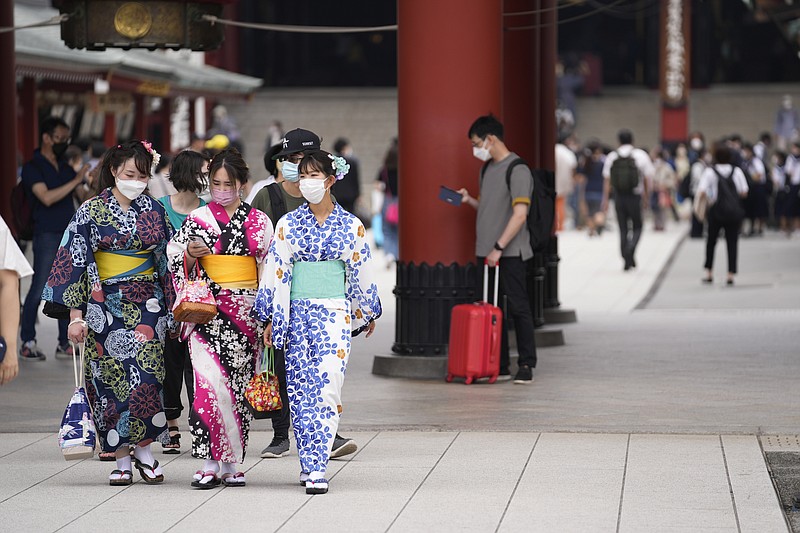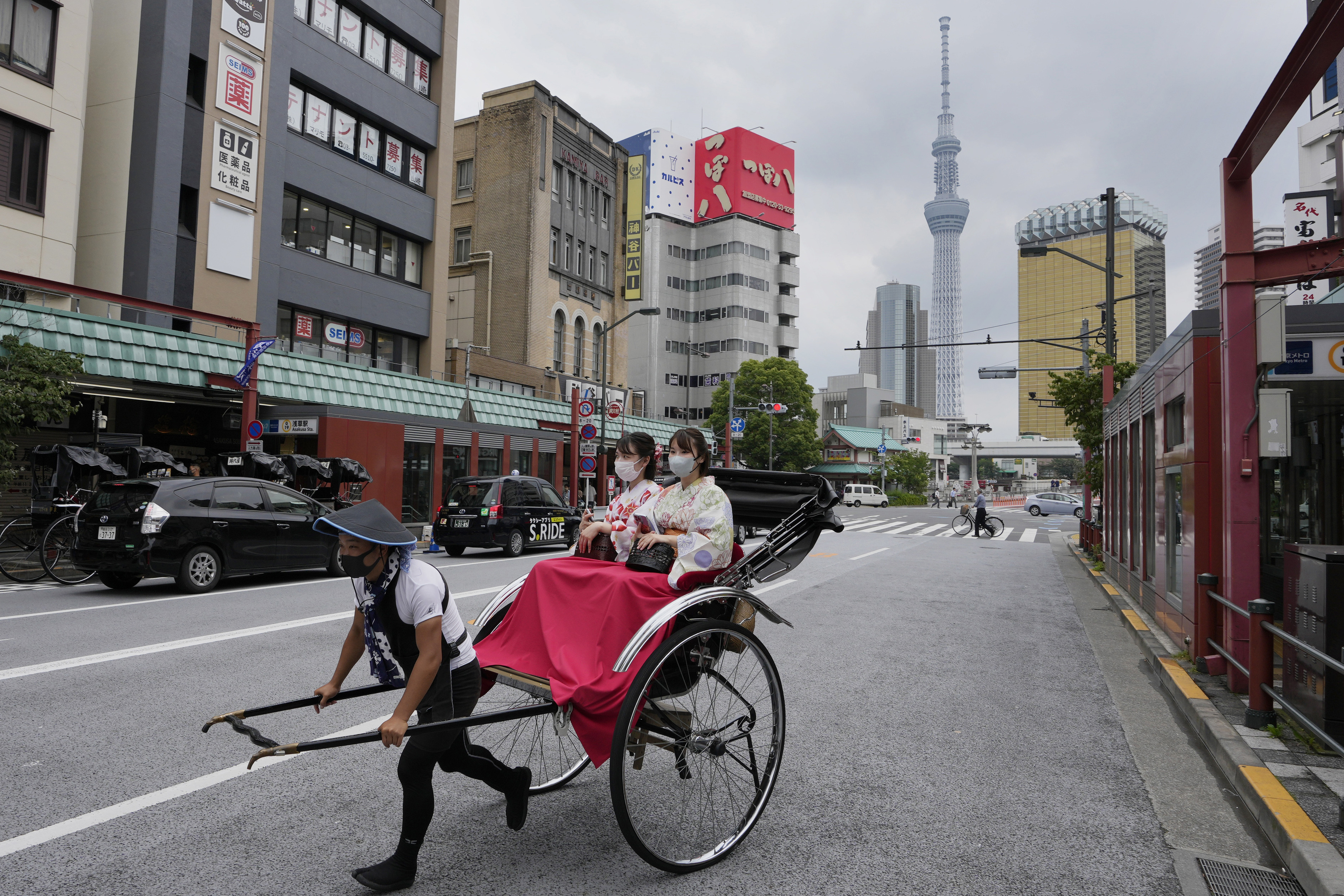TOKYO -- The rickshaw men in Tokyo are adding English-speaking staff, a sure sign Japan is bracing for a return of tourists from abroad.
Japan's border controls to curb the spread of coronavirus infections began gradually loosening last month.
That's great news for Yusuke Otomo, owner of Daikichi, a kimono rental shop in Asakusa, an old district of Tokyo famous for its temples, quaint restaurants and rickshaw rides. He can barely contain his excitement.
"Those were a hard three years. But we managed to endure until today. And after such an experience, to think people from abroad can finally come back is simply thrilling," Otomo told The Associated Press.
"I'm thinking that maybe, just as before covid, my shop, the city of Asakusa and everyone's hearts can flourish again. I can't wait."
The crowds are finally back with a gradual relaxing of the city's covid-19 restrictions, which called for restaurants to close early and people to social distance and limit attendance at events. But most of the visitors are Japanese.
Shuso Imada, general manager at JSS Information Center, a sake and shochu showroom in downtown Tokyo, said he has been feeling pretty lonely and is itching to tell foreign visitors about how to match the traditional Japanese rice wine with all kinds of non-Japanese food, even cheese and beef.
"In a way, we didn't have much to do and we just had to wait. The gates have now reopened," he said.
Visitors have to abide by guidelines requiring travelers to have a special coordinator, stay on specific routes and abide by rules like wearing masks and regularly using disinfectant.
Before covid, tourism was booming as a mainstay of Japan's economy, the world's third largest. Foreign visitors numbered a record 32 million in 2019 and the target for 2020 was 40 million. After covid struck, the government gradually imposed restrictive limits on foreign arrivals, for a time excluding many foreign residents.
As of June 10, it is allowing foreign tourists to visit, but in limited numbers and only on group tours, not as individual travelers.
Visas are required for nearly everyone, even those from countries that normally would have visa-free entry. And they're available only to travelers from 98 so-called blue countries, including the U.S., who are deemed to pose a minimal health risk and can enter without a quarantine if they show proof they tested negative for covid within 72 hours of their departures.
Japan, a crowded island nation, is wary about outside risks and infectious diseases. After about two years of seeing very few tourists, Japanese have some adjusting to do, Otomo and others said.
So the authorities are taking it slow.
"I would love to have tourists from abroad come, as long as everyone, including myself, abides by the rules, like wearing masks and keeping sanitary standards," said Minaho Iwase, who was visiting Tokyo from Aichi, central Japan, recently.
Back in Asakusa, rickshaw man Shunpei Katayama has yet to drive around his first post-covid foreign tourist, but English-speaking drivers are back on the job. And for now, Japanese visitors from outside Tokyo are keeping him busy.
"Japanese who can't go to Guam and other spots abroad come visit Shibuya. And Asakusa," he said.
On a recent day, Otomo was shooting photos of a Japanese mother and daughter dressed up in colorful kimono to attend a friend's wedding in Tokyo.
The foreign clientele that used to frequent his shop were so enthusiastic about dressing up as samurai, ninja and geisha, complete with swords and hair ornaments. Some quickly became friends, regardless of their nationalities, Otomo recalled a bit sentimentally.
"When they're happy, I'm happy. They get my adrenaline going," he said.
Information for this article was contributed by Tassanee Vejpongsa and Haruka Nuga of The Associated Press.
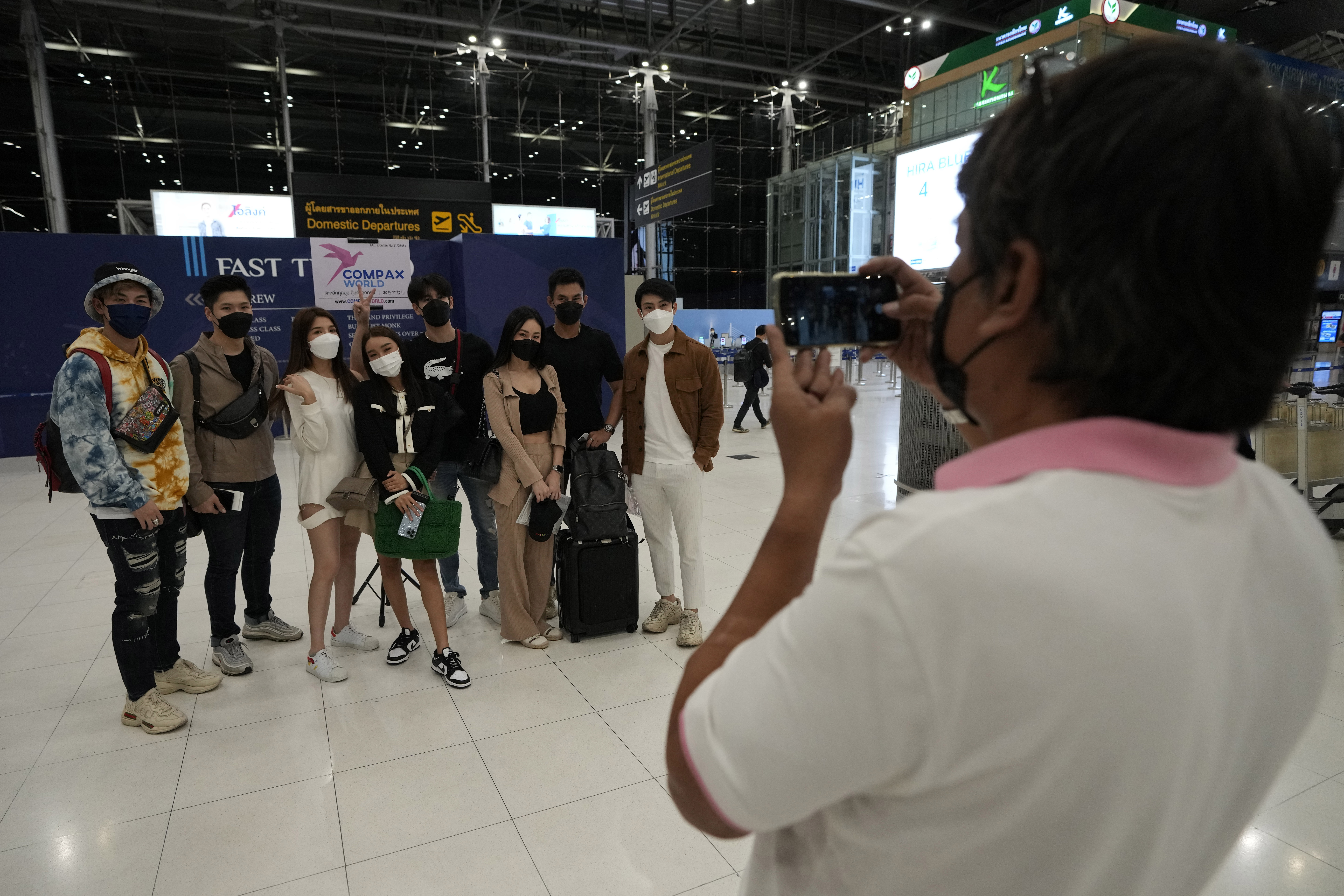 A staff member of a travel agent takes a photo of Thai travelers, from left to right, Sorrasek Thuantawee, Kantpong Madeecharoenporn, Tidarat Margsree, Korranut Nuntanatamon, Tiwasit Ruensorn, Rossarin Chanlekha, Jirawat Jaradwutthikul and Sathaporn Maneephol after check-in for their trip to Osaka and Tokyo, at Suvarnabhumi International Airport in Samut Prakarn province, Thailand, Thursday, June 23, 2022. A group of eight young Thai travelers are excited to return to their favorite tourist destination. Japan is bracing for a return of tourists from abroad, as border controls to curb the spread of coronavirus infections are gradually loosened. Visas are being given only to certain countries, including Thailand and the U.S., that are deemed to pose a minimal health risk, so people can enter without a quarantine. (AP Photo/Sakchai Lalit)
A staff member of a travel agent takes a photo of Thai travelers, from left to right, Sorrasek Thuantawee, Kantpong Madeecharoenporn, Tidarat Margsree, Korranut Nuntanatamon, Tiwasit Ruensorn, Rossarin Chanlekha, Jirawat Jaradwutthikul and Sathaporn Maneephol after check-in for their trip to Osaka and Tokyo, at Suvarnabhumi International Airport in Samut Prakarn province, Thailand, Thursday, June 23, 2022. A group of eight young Thai travelers are excited to return to their favorite tourist destination. Japan is bracing for a return of tourists from abroad, as border controls to curb the spread of coronavirus infections are gradually loosened. Visas are being given only to certain countries, including Thailand and the U.S., that are deemed to pose a minimal health risk, so people can enter without a quarantine. (AP Photo/Sakchai Lalit)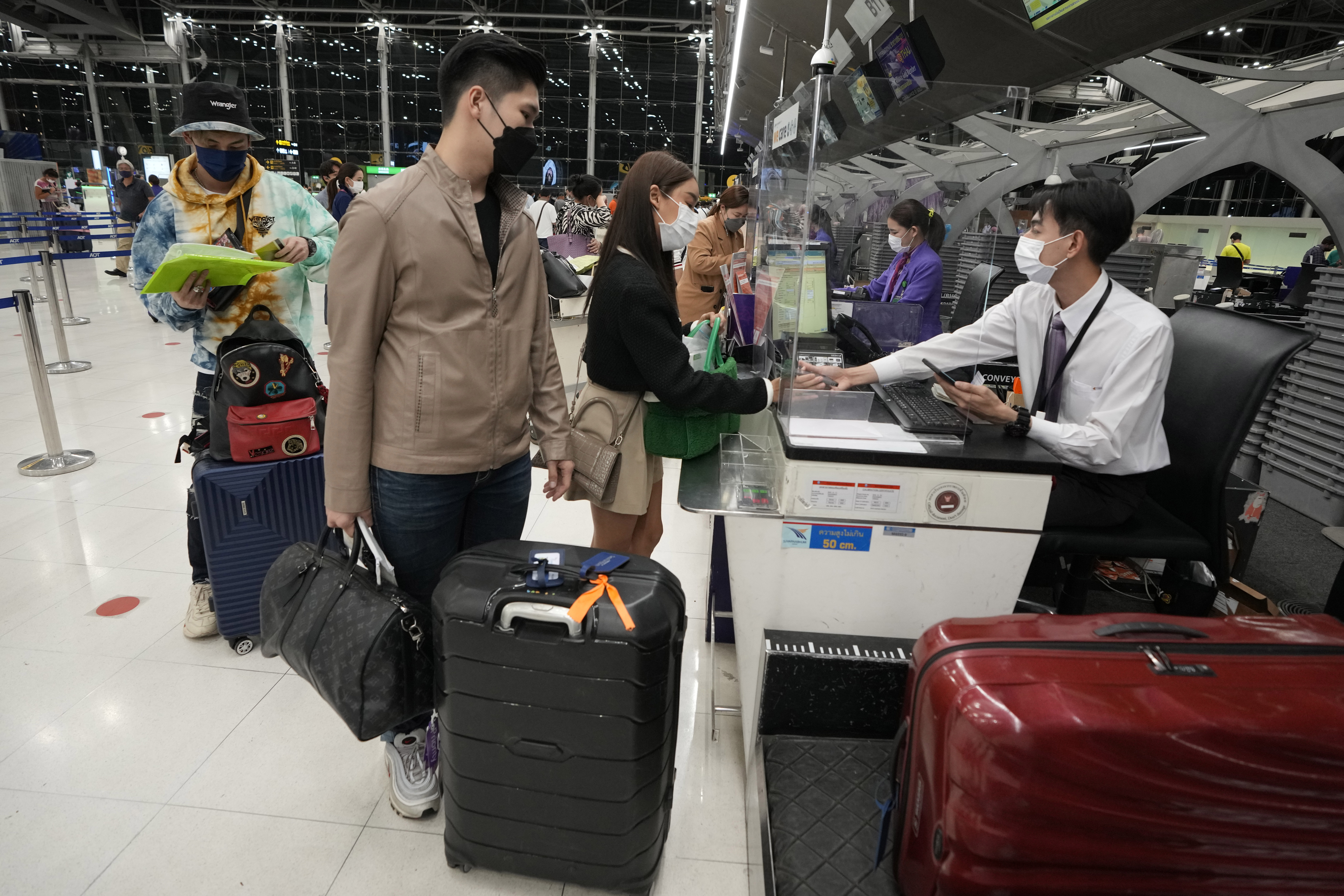 Thai travelers, from left, Sorrasek Thuantawee, Kantpong Madeecharoenporn and Korranut Nuntanatamon check in for their trip to Osaka and Tokyo, at Suvarnabhumi International Airport in Samut Prakarn province, Thailand, Thursday, June 23, 2022. A group of eight young Thai travelers are excited to return to their favorite tourist destination. In less than two weeks since the news of Japan reopening its door to international visitors. A group of eight young Thai travelers are excited to return to their favorite tourist destination. Japan is bracing for a return of tourists from abroad, as border controls to curb the spread of coronavirus infections are gradually loosened. Visas are being given only to certain countries, including Thailand and the U.S., that are deemed to pose a minimal health risk, so people can enter without a quarantine. (AP Photo/Sakchai Lalit)
Thai travelers, from left, Sorrasek Thuantawee, Kantpong Madeecharoenporn and Korranut Nuntanatamon check in for their trip to Osaka and Tokyo, at Suvarnabhumi International Airport in Samut Prakarn province, Thailand, Thursday, June 23, 2022. A group of eight young Thai travelers are excited to return to their favorite tourist destination. In less than two weeks since the news of Japan reopening its door to international visitors. A group of eight young Thai travelers are excited to return to their favorite tourist destination. Japan is bracing for a return of tourists from abroad, as border controls to curb the spread of coronavirus infections are gradually loosened. Visas are being given only to certain countries, including Thailand and the U.S., that are deemed to pose a minimal health risk, so people can enter without a quarantine. (AP Photo/Sakchai Lalit)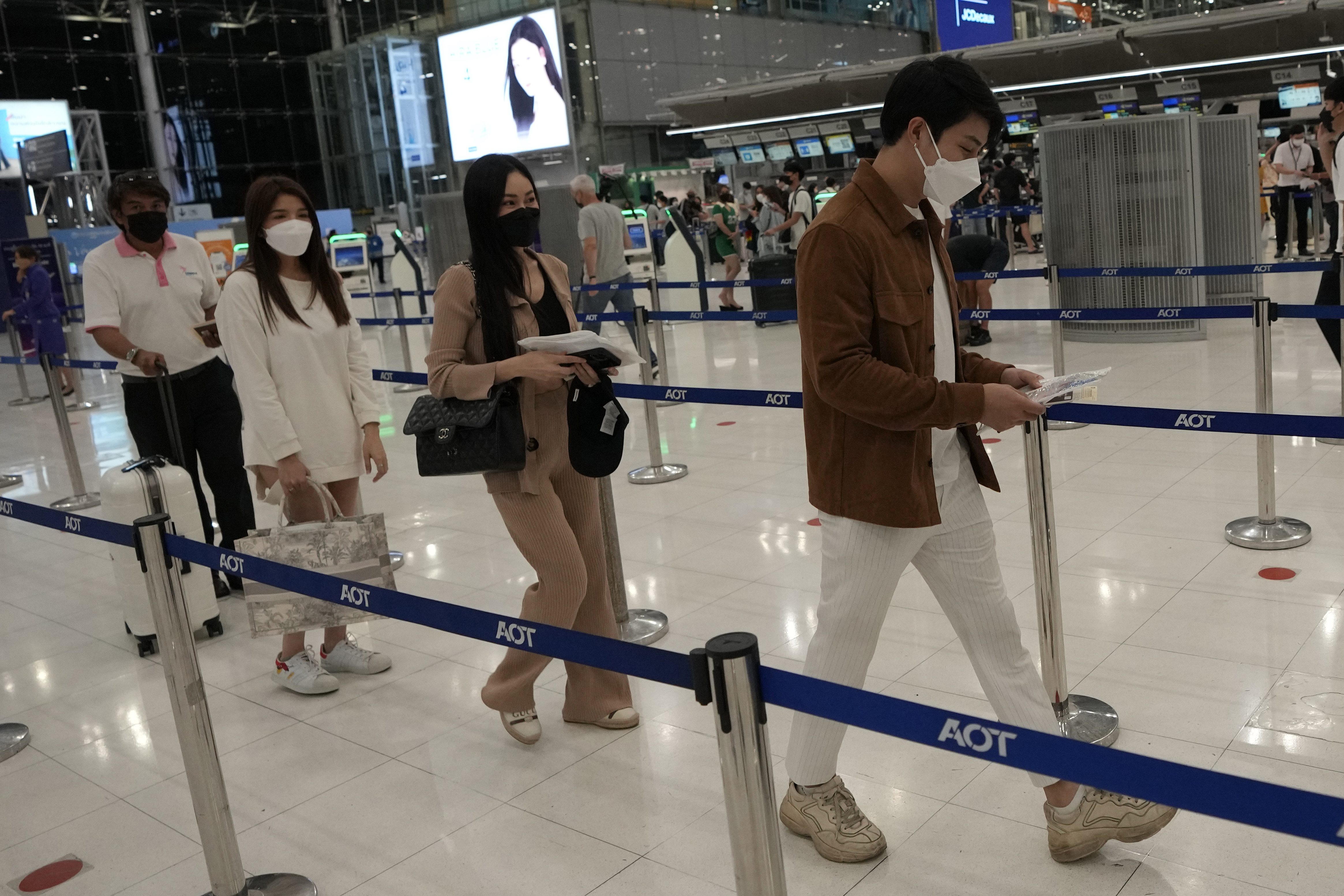 Thai travelers Tidarat Margsree second from left to right, Rossarin Chanlekha, Sathaporn Maneephol, line up for check-in for their trip to Osaka and Tokyo, at Suvarnabhumi International Airport in Samut Prakarn province, Thailand, Thursday, June 23, 2022. A group of eight young Thai travelers are excited to return to their favorite tourist destination. Japan is bracing for a return of tourists from abroad, as border controls to curb the spread of coronavirus infections are gradually loosened. Visas are being given only to certain countries, including Thailand and the U.S., that are deemed to pose a minimal health risk, so people can enter without a quarantine. (AP Photo/Sakchai Lalit)
Thai travelers Tidarat Margsree second from left to right, Rossarin Chanlekha, Sathaporn Maneephol, line up for check-in for their trip to Osaka and Tokyo, at Suvarnabhumi International Airport in Samut Prakarn province, Thailand, Thursday, June 23, 2022. A group of eight young Thai travelers are excited to return to their favorite tourist destination. Japan is bracing for a return of tourists from abroad, as border controls to curb the spread of coronavirus infections are gradually loosened. Visas are being given only to certain countries, including Thailand and the U.S., that are deemed to pose a minimal health risk, so people can enter without a quarantine. (AP Photo/Sakchai Lalit)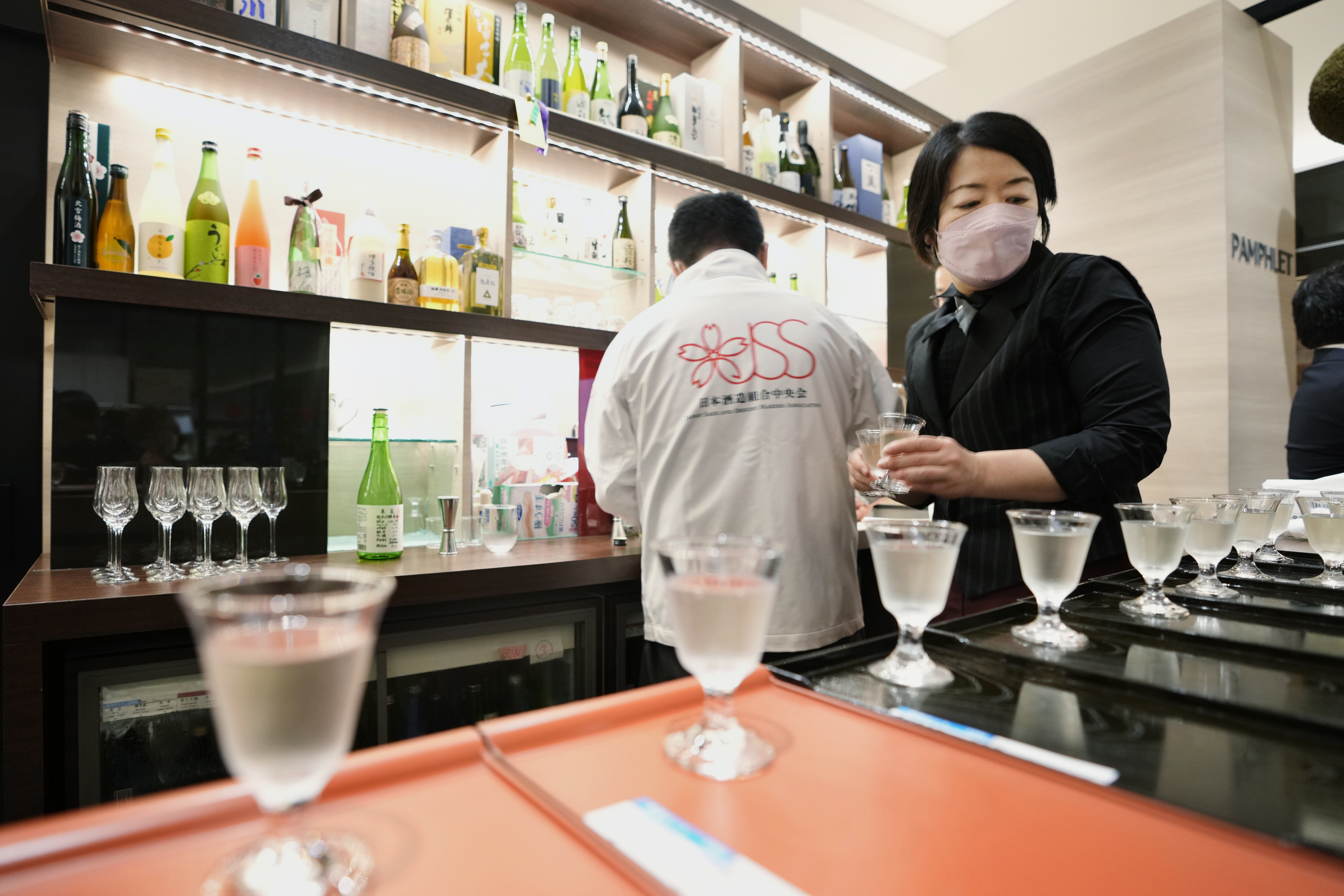 Megumi Nishimiya, a staffer for the Japan Sake and Shochu Makers Association (JSS) Information Center, helps prepare glasses of alcohol beverage before handing out the drinks during a sake and shochu tasting event at the information center in Tokyo, Wednesday, June 22, 2022. Shuso Imada, general manager at JSS Information Center, a sake and shochu showroom in downtown Tokyo, said he has been feeling pretty lonely and is itching to tell foreign visitors about how to match the traditional Japanese rice wine with all kinds of non-Japanese food, even cheese and beef. (AP Photo/Hiro Komae)
Megumi Nishimiya, a staffer for the Japan Sake and Shochu Makers Association (JSS) Information Center, helps prepare glasses of alcohol beverage before handing out the drinks during a sake and shochu tasting event at the information center in Tokyo, Wednesday, June 22, 2022. Shuso Imada, general manager at JSS Information Center, a sake and shochu showroom in downtown Tokyo, said he has been feeling pretty lonely and is itching to tell foreign visitors about how to match the traditional Japanese rice wine with all kinds of non-Japanese food, even cheese and beef. (AP Photo/Hiro Komae)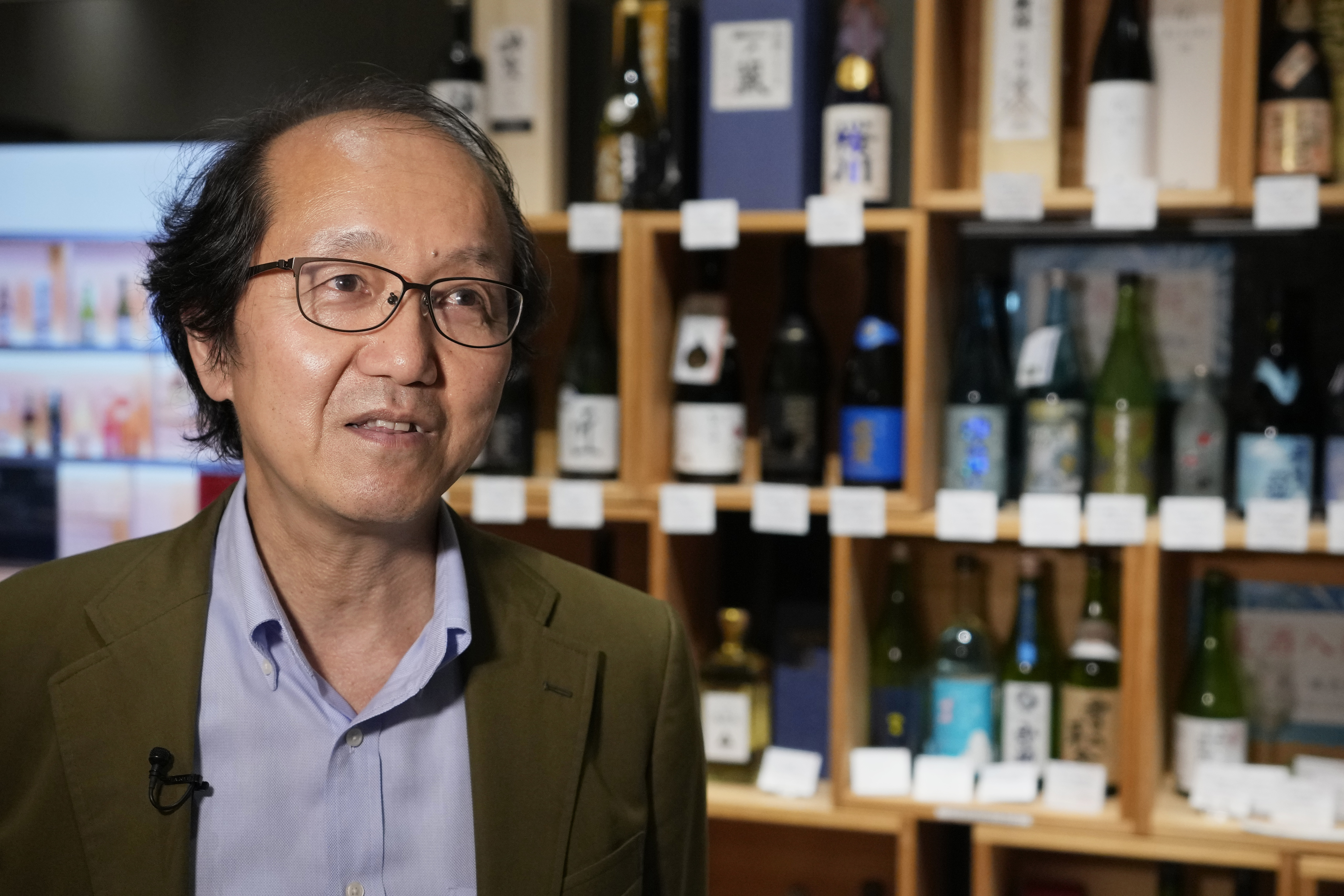 Shuso Imada, general manager for the Japan Sake and Shochu Makers Association Information Center, speaks in an interview with The Associated Press during a sake and shochu tasting event at the information center in Tokyo, Wednesday, June 22, 2022. Imada said he has been feeling pretty lonely and is itching to tell foreign visitors about how to match the traditional Japanese rice wine with all kinds of non-Japanese food, even cheese and beef. (AP Photo/Hiro Komae)
Shuso Imada, general manager for the Japan Sake and Shochu Makers Association Information Center, speaks in an interview with The Associated Press during a sake and shochu tasting event at the information center in Tokyo, Wednesday, June 22, 2022. Imada said he has been feeling pretty lonely and is itching to tell foreign visitors about how to match the traditional Japanese rice wine with all kinds of non-Japanese food, even cheese and beef. (AP Photo/Hiro Komae)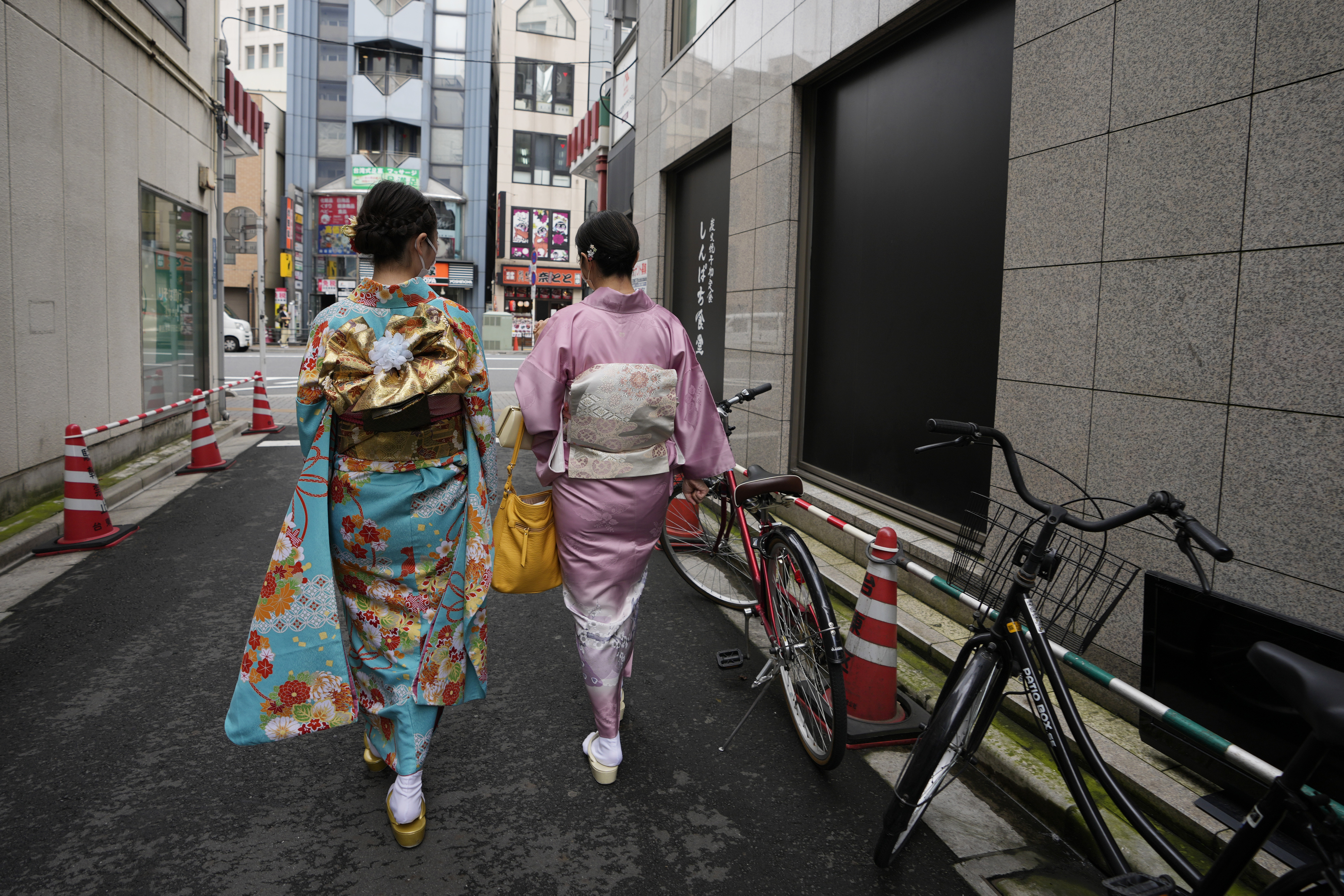 A Japanese woman and her daughter leave Daikichi kimono rental shop Wednesday, June 22, 2022, in Tokyo's Asakusa area famous for sightseeing, before attending their family friend's wedding. Japan is bracing for a return of tourists from abroad, as border controls to curb the spread of coronavirus infections are gradually loosened. Yusuke Otomo, who owns the kimono rental shop, can barely contain his excitement. (AP Photo/Hiro Komae)
A Japanese woman and her daughter leave Daikichi kimono rental shop Wednesday, June 22, 2022, in Tokyo's Asakusa area famous for sightseeing, before attending their family friend's wedding. Japan is bracing for a return of tourists from abroad, as border controls to curb the spread of coronavirus infections are gradually loosened. Yusuke Otomo, who owns the kimono rental shop, can barely contain his excitement. (AP Photo/Hiro Komae)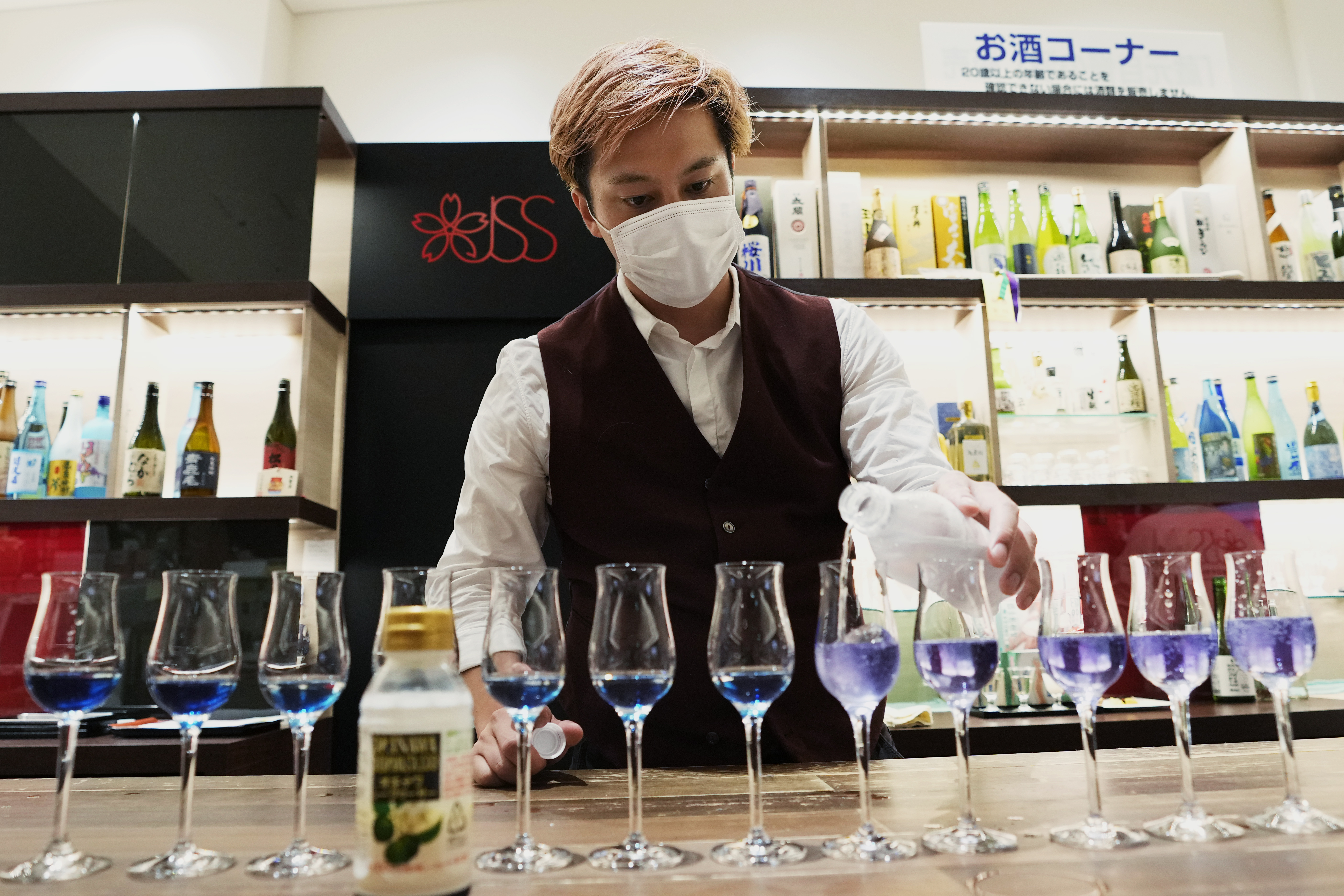 Yusuke Koike, manager for the overseas operation division of the Japan Sake and Shochu Makers Association (JSS), prepares alcohol beverage during a sake and shochu tasting event at JSS Information Center in Tokyo, Wednesday, June 22, 2022. Shuso Imada, general manager at the JSS Information Center, a sake and shochu showroom in downtown Tokyo, said he has been feeling pretty lonely and is itching to tell foreign visitors about how to match the traditional Japanese rice wine with all kinds of non-Japanese food, even cheese and beef. (AP Photo/Hiro Komae)
Yusuke Koike, manager for the overseas operation division of the Japan Sake and Shochu Makers Association (JSS), prepares alcohol beverage during a sake and shochu tasting event at JSS Information Center in Tokyo, Wednesday, June 22, 2022. Shuso Imada, general manager at the JSS Information Center, a sake and shochu showroom in downtown Tokyo, said he has been feeling pretty lonely and is itching to tell foreign visitors about how to match the traditional Japanese rice wine with all kinds of non-Japanese food, even cheese and beef. (AP Photo/Hiro Komae)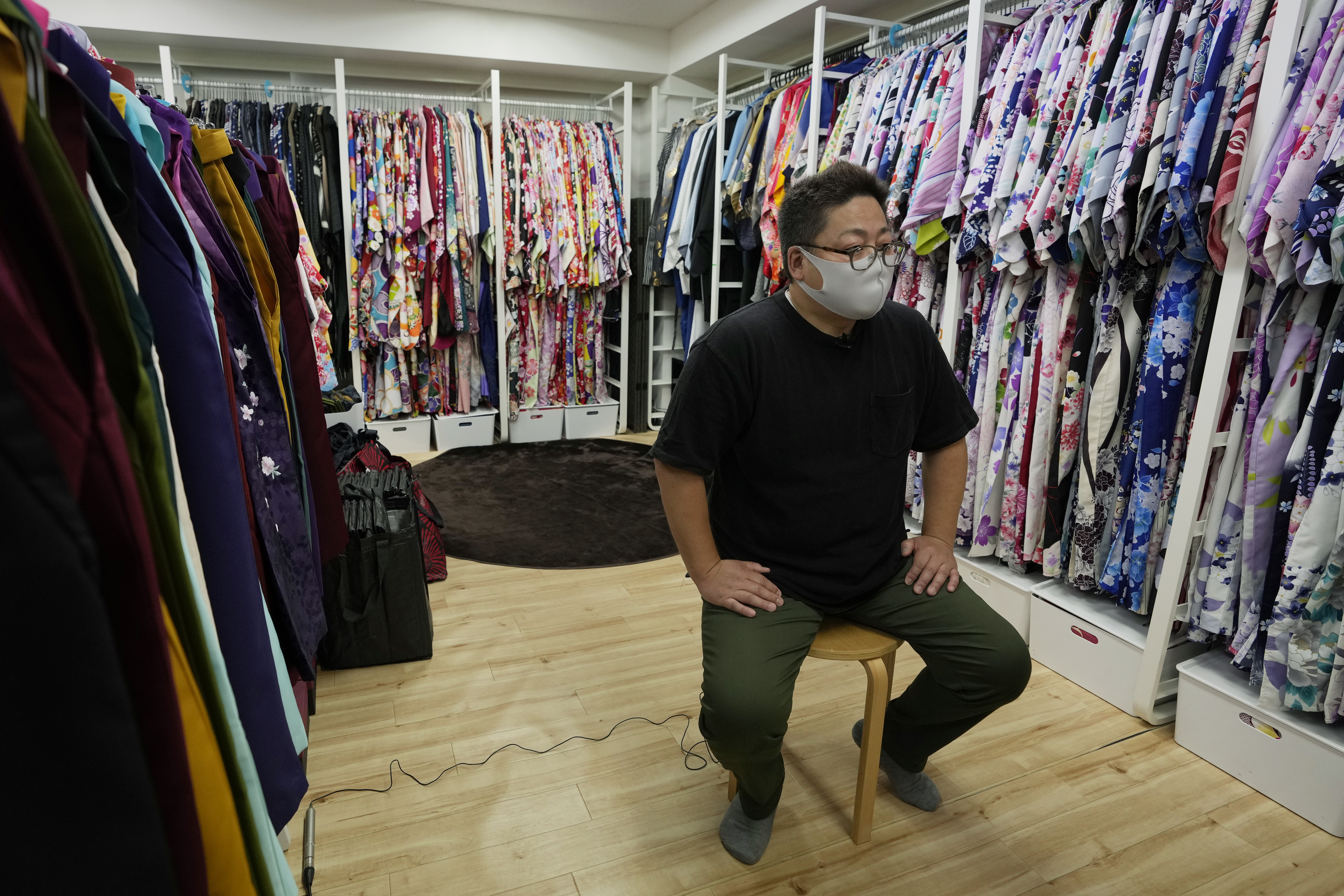 Yusuke Otomo, the owner of Daikichi kimono rental shop, speaks during an interview with The Associated Press at his shop Wednesday, June 22, 2022, in Tokyo's Asakusa area famous for sightseeing. Japan is bracing for a return of tourists from abroad, as border controls to curb the spread of coronavirus infections are gradually loosened. Otomo can barely contain his excitement. (AP Photo/Hiro Komae)
Yusuke Otomo, the owner of Daikichi kimono rental shop, speaks during an interview with The Associated Press at his shop Wednesday, June 22, 2022, in Tokyo's Asakusa area famous for sightseeing. Japan is bracing for a return of tourists from abroad, as border controls to curb the spread of coronavirus infections are gradually loosened. Otomo can barely contain his excitement. (AP Photo/Hiro Komae)